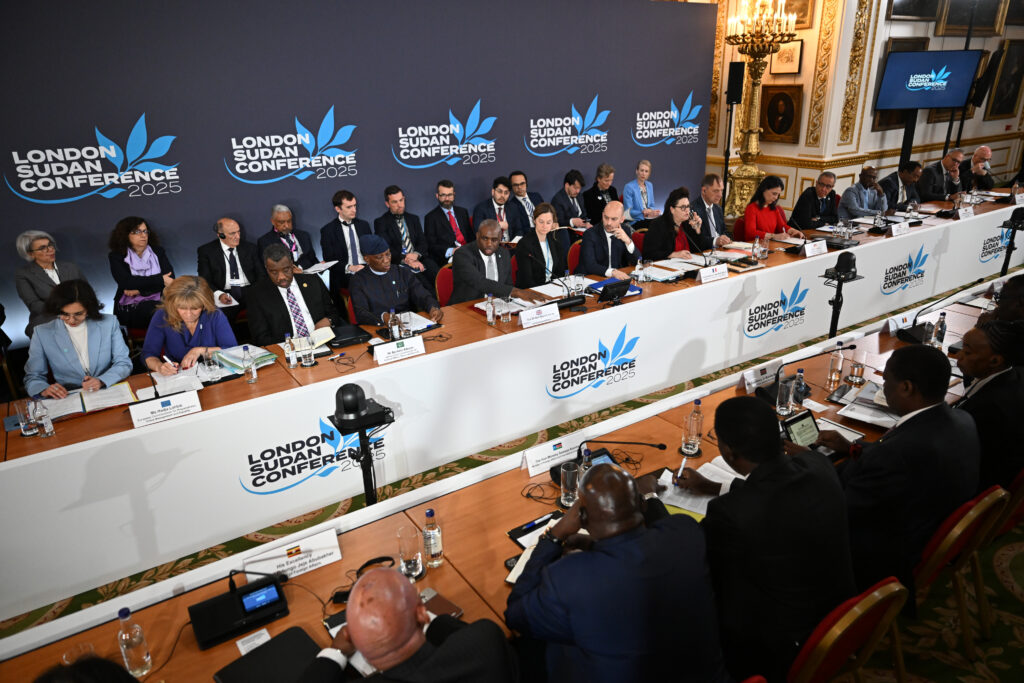Interviews / Africa/s
2 May 2025
London Conference on Sudan: What Prospects After Uninspiring Diplomatic Outcomes?

The United Kingdom, France, Germany, the European Union and the African Union co-chaired the London Conference on Sudan on 16 April 2025, marking the beginning of the third year of fighting. The civil war opposing the Sudanese Armed Forces (SAF), which form the de facto government, and the Rapid Support Forces (RSF) began in April 2023, when General Abdel Fattah al-Burhan and General Mohamed Hamdan Dagalo, known as Hemedti, turned against each other in a violent struggle for power. Why did London host a summit to support Sudan? What were the objectives, and what results were achieved? Is partition of Sudan a possibility? Answers from Clémence Noisette, research assistant at IRIS.
Why did London host a summit on 16 April 2025 to support Sudan?
The conflict in Sudan has been largely ignored by the international, African and Western press for the past two years. Sudan is facing a long-standing structural crisis, having experienced several internal conflicts since its independence, which partly explains the limited mobilisation of international diplomatic bodies. Yet it has resulted in the world’s worst humanitarian crisis. More than eleven million Sudanese are internally displaced, nearly four million have fled the country, and 64% of the population is in need of assistance (OCHA). Sudan is experiencing the worst current hunger crisis: twenty-five million Sudanese are in acute food insecurity, and more than six hundred thousand face famine (WFP). Despite this catastrophic humanitarian situation, efforts to mobilise support for Sudan remain rare and ineffective.
As a former colonial power, the United Kingdom has remained engaged in Sudanese affairs. In the 1990s, it formed a troika with the United States and Norway to support peace efforts in Sudan and the path to South Sudanese independence. The UK is one of the members of the “Friends of Sudan”, the most significant international forum for Sudan’s transition process. This group brought together Western countries, regional actors, and the Sudanese government that emerged from the 2019 democratic revolution to monitor progress in the transition.
Since his appointment as Secretary of State for Foreign, Commonwealth and Development Affairs in July 2024, David Lammy has attempted to shift the dynamics on Sudan. During the UK’s presidency of the UN Security Council in November 2024, the UK and Sierra Leone co-drafted a resolution on the protection of civilians. The draft resolution aimed to create a mechanism for implementing commitments to civilian protection stemming from the Jeddah Declaration, signed by the RSF and SAF in May 2023. The resolution received fourteen votes in favour, but was vetoed by Russia, which backed the SAF. General al-Burhan accused the text of placing the RSF and SAF on equal footing, violating Sudanese sovereignty by mentioning the possibility of foreign military intervention, and favouring justice by the International Criminal Court over Sudanese authorities. The UK Foreign Secretary also travelled in January 2025 to the town of Adré, on the Chad-Sudan border, to meet Sudanese refugees.
Building on the Conference for Sudan and Neighbouring Countries, co-organised in Paris by France, Germany and the European Union in April 2024, David Lammy convened in London representatives from Saudi Arabia, Canada, Egypt, the United Arab Emirates, the United States, Ethiopia, Kenya, Norway, Qatar, South Sudan, Switzerland, Chad, Turkey, and Uganda. Delegates from the African Union, European Union, Arab League and the United Nations were also present. By bringing together regional actors, international political bodies and Western countries, the summit aimed to forge a hegemonic multilateral position on resolving the Sudanese conflict.
What were the summit’s objectives, and what results were achieved?
The main objective of the summit was to create political coherence among the actors involved in the international response. The absence of Sudanese representatives — neither from the SAF nor the RSF — made it clear that a ceasefire agreement would not be signed at the summit. Nevertheless, the idea remained to find a “pathway to peace” by uniting voices and efforts.
Although ambitions were already limited, the results fell short of the summit’s objectives due to disagreement between Egypt, Saudi Arabia and the United Arab Emirates, all of whom exert influence over the conflict.
Egypt: President Al-Sisi views General al-Burhan as a key ally for regional stability, particularly in the ongoing dispute with Ethiopia over the construction of the Grand Ethiopian Renaissance Dam. This dam would give Addis Ababa control over Nile water management, which concerns both Sudan and Egypt. Cairo has therefore provided military, financial and humanitarian support to al-Burhan’s government since his 2021 coup.
Saudi Arabia: In order to contain Iranian industrial and technological influence in Sudan, Riyadh has heavily financed al-Burhan’s government. Tehran is not playing a political game, but has asserted itself through drone exports since the war began. Saudi Arabia primarily seeks to establish itself as a credible mediator. Thus far, only the Jeddah negotiations have led to an agreement signed by the SAF and RSF, although it has not been implemented.
United Arab Emirates: Abu Dhabi is the main sponsor of the RSF. The Emirates appear to be providing military aid via a corridor on the Chad-Sudan border, violating the UN arms embargo. They have consistently denied these accusations. As the world’s second-largest gold hub, the UAE also plays a key role in the sector, with around 90% of Sudanese gold ending up in the country via legal or illicit trade channels.
The Sudanese conflict is marked by the intervention of regional actors. London was counting on convergence between these three states to produce a joint communiqué. However, for the first time, Egypt and Saudi Arabia publicly expressed disagreement with the UAE’s support for the RSF. Moreover, Egypt and Saudi Arabia argued for including a reference to state institutions in the joint communiqué, implicitly endorsing the legitimacy of the SAF government. The Emirates preferred a formulation invoking civilian governance. As a result of this impasse, the conference concluded with a statement from the co-chairs and failed to establish a contact group to relaunch indirect mediation.
Furthermore, the conference will not provide adequate support for civilians facing the ongoing humanitarian catastrophe. A total of €950 million in aid was pledged, including €282 million in EU donations. This sum falls far short of meeting the urgent needs of the Sudanese people. The UN estimates that $6 billion are needed to address the multiple crises, including $4.2 billion for humanitarian response and $1.8 billion for displaced people in neighbouring countries. Only one sixth of the required funding will be made available, if the pledged amounts are actually disbursed. The most vulnerable populations are already suffering from the decline in multilateral aid. The call to guarantee safe and unrestricted humanitarian access to Sudan has, so far, not translated into concrete measures. The summit is therefore unable to respond to the structural crisis currently affecting Sudan.
Alongside the summit, General Hemedti announced the creation of a parallel administration to that of General al-Burhan. Is Sudanese partition a possibility?
On 16 April 2025, General Hemedti announced via Telegram the creation of an administration for “peace and unity”. The founding charter was signed on 22 February 2025 in Nairobi by the RSF and twenty-three other rebel groups. The creation of this new administration has fuelled concerns about a possible de facto partition of Sudan. Until now, the RSF did not provide any administrative system and thus offered no alternative to al-Burhan’s government. Now, if the frontlines stabilise, Sudan could fragment into zones of influence controlled by the two belligerents.
As this is a war for power and control over natural resources, neither general wishes to stop fighting. Both camps are political heirs of the military dictatorship of Omar al-Bashir (1989–2019), who joined forces in 2021 to suppress the 2019 democratic revolution, before turning against each other in 2023. Both are accused of war crimes and crimes against humanity and do not hesitate to endanger civilians to pursue their military ambitions. They instrumentalise communities and socio-ethnic groups – invoking memories of past crises and tensions over natural resources – to secure allied support. Through successive statements, both Hemedti and al-Burhan have declared that the war will only end with military victory. The SAF’s recapture of Khartoum in March 2025 could have marked a decisive turning point in the conflict. However, the RSF has continued its offensive in Khartoum, strengthened its coalition — notably through an agreement with the Sudan People’s Liberation Movement-North (SPLM-North), active on the Sudan–South Sudan border — and expanded operations northwards, previously a relatively spared region.
Numerous natural resources, including gold, arable land, livestock, minerals and gum arabic, are influencing the dynamics of the Sudanese war. Gold has quickly emerged as a central element of the conflict, both as a cause and as a means. In the past, control over gold-rich areas, such as northern Darfur, motivated violent RSF action to seize control of production and export routes. The high value of gold and its role in financing both local and external actors make it essential to the continuation and evolution of the current conflict. This lucrative trade makes the end of the conflict unlikely, as both belligerents will cling to resource-rich areas under their control.
Partition of the country is a red line for all actors involved in conflict resolution. The co-chairs of the London Summit underlined the importance of preventing Sudan’s partition in their communiqué, while Egypt and the African Union reiterated the same position. Beyond the violation of Sudan’s territorial integrity and the principle of the inviolability of borders in Africa, fragmentation of the country would further complicate the path to peace and international monitoring of the humanitarian situation.
The international community must persevere in the search for a lasting peace. Today, neither general is seen as fully legitimate to lead Sudan. After the failure of US-led mediation, the Biden administration issued sanctions in January 2025, at the very end of its term, against the RSF, accused of genocide, and then against the SAF. Through this dual decision, the United States stated that neither al-Burhan nor Hemedti represents a peaceful future for Sudan. The Trump administration has not yet taken a position on the war in Sudan. Similarly, no Sudanese representative was invited to the London Summit. As such, international efforts must focus on representing the interests of the Sudanese people. Finally, regional powers must provide guarantees for their commitments to peace. Every year, Egypt and the UAE sign declarations condemning foreign interference in Sudan, while continuing to provide direct support.
By organising this conference, the United Kingdom briefly brought Sudan to the forefront of the diplomatic stage. However, the summit’s limited results and low media visibility prove that diplomatic efforts will need to be repeated over the long term before any resolution to the conflict can be found.

